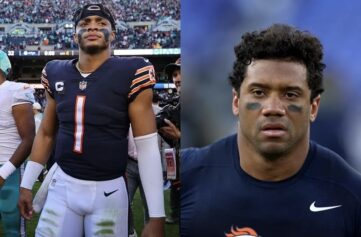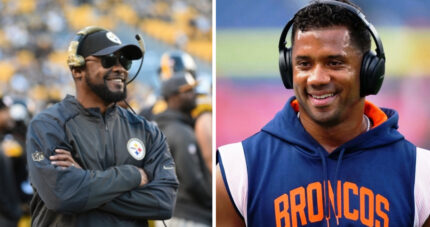There’s a wealth of Black starting quarterbacks taking the field this upcoming weekend in college football and the NFL. We’d be remiss if we didn’t give major props to the unsung pioneers of the Black quarterback position.
Before we got to the record 10 Black starting quarterbacks in 2020, there were many qualified African-American signal callers who never got the opportunity to shine because of racism, bigotry, and systemic oppression.
RELATED: Black Quarterback Chronicles: 10 Black Starting Quarterbacks First Time In NFL History
Guys like 1994 Heisman Trophy-winning QB Charlie Ward, who was disrespectfully undrafted, forcing him to play nine years in the NBA. He was a serviceable hoops pro, but elite as a quarterback.
Joe Gilliam was a victim of the times as well.
The Originators
When thinking about the history of black quarterbacks in the NFL, many will call the names of Doug Williams. He was the first Black quarterback to win a Super Bowl in 1988. Or Warren Moon. His pure passing ability is second to none.
Or they may mention more contemporary names such as Randall Cunningham, Steve McNair, and Mike Vick, who transcended the field, represented hard in the 90s, and opened the door wider for the next generation of melanated signal-callers.
The Magician: Marlin Briscoe
Nowadays the names of Black quarterbacks roll off tongues easily and with little thought. Black people don’t even have to support a quarterback just because he’s Black anymore.
There’s Patrick Mahomes, Lamar Jackson, Russell Wilson and Deshaun Watson… just to name a few.
But when you speak of who pioneered the way for the modern-day black QB, there is only one, Marlin “The Magician” Briscoe.
NFL trailblazer Marlin Briscoe. #BlackHistoryMonth pic.twitter.com/EUJhSI3VeB
— Ken Gelman (@kengfunk) February 6, 2019
Briscoe was revolutionary, proving to the world that Black players could execute the physical and cerebral functions required to play quarterback as well as their white counterparts.
Although he was not the very first black quarterback to play in an NFL game — that distinction belongs to Willie Thrower who played in one game for the Chicago Bears in 1953 — he was the first to start.
Against All Odds
Born in Oakland at age five, Marlin and his family moved to Omaha, Nebraska where he would reside for his childhood and teenage years.
Briscoe earned All-City and All-State honors while attending Omaha South High School. He would next choose to stay at home and play for Omaha University (now University of Nebraska-Omaha) where he would rewrite the record books.
In his senior year (1967), Briscoe was named First-Team All-American passing for 2,283 and 25 touchdowns en route to leading the Indians to a Central Intercollegiate Conference title.
Despite being only 5’10 and 177 pounds, the Denver Broncos selected Briscoe in the 14th round of the 1968 draft. However, the team listed him eighth on the QB depth chart and switched him to defensive back.
It wasn’t until Week 3 of the season that opportunity would present itself as starting quarterback Steve Tensi suffered a broken collarbone.
First Black Starting Quarterback In NFL History
Head coach Lou Saban summoned Briscoe from the sidelines in the fourth quarter against the Patriots to give him a shot. Briscoe’s first play was a 22-yard completion.
On his second series, he orchestrated an 80-yard touchdown drive. He completed a 21-yard pass and ran for 38 more himself, carrying it the last 12 yards for the score. The very next week, October 6th, 1968, Marlin Briscoe became the first black starting quarterback in NFL history.
Briscoe started the next five games, going 2-3 for Denver, but would go on to set an NFL record by throwing 14 touchdown passes in 11 games, a Broncos rookie record that still stands today.
Despite showing flashes and performing well, he would be converted to a wide receiver for the remaining years of his career.
Remember when one general manager suggested that Lamar Jackson become a wide receiver?
When Brisco played, that’s how every white GM, coach, and owner felt.
Bill Polian on Lamar Jackson: "I think he’s a wide receiver and a dynamic wide receiver."
Us once again: pic.twitter.com/m4D6f8yqeW
— The Shadow League (@ShadowLeague) January 19, 2018
Lamar could probably have played wide receiver, he’s an incredible athlete, but he’s a better quarterback. His MVP award proved it.
Briscoe could have done some amazing things for the Broncos as a quarterback if they didn’t cower to the stereotypes that were prevalent back then.
Instead, Briscoe was selected to the Pro Bowl in 1970 while playing receiver for the Buffalo Bills. The Magician grabbed 57 receptions for 1036 yards and 8 touchdowns. He was also a member of the historic 1972 Miami Dolphins, the only NFL team to have a perfect season.
The year following Briscoe’s successful debut with the Broncos, four black quarterbacks were drafted, thus beginning a slow, but crucial, change in perception that helped transform football at all levels.
Fast forward to today, and Briscoe’s impact can be felt throughout the league. Before there was Donovan McNabb, Cam Newton, and RGIII, and this seemingly endless pipeline of captivating, Uber talented Black quarterbacks, there was the Magician.
Respect.



